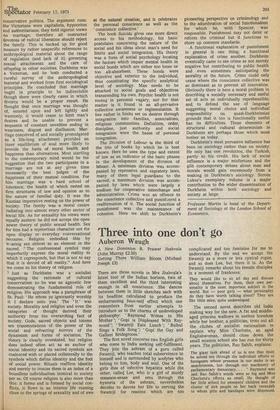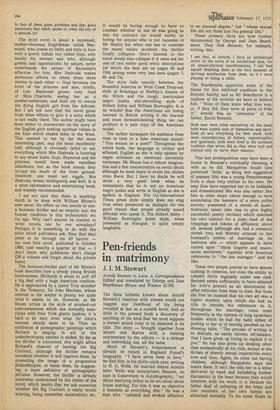Three into one don't go
Auberon Waugh
A New Dominion R. Prawer Jhabvala (John Murray £2.50) Getting There William Bloom (Michael Joseph £3) There are three novels in Mrs Jhabvala's latest tour of the Indian horizon, two of them excellent and the third interesting enough in all conscience: She dances between them in little sketches each with its headline calculated to produce the embarrassing faux-nal effect which one remembers from earlier attempts to introduce us to the charms of undeveloped philosophy: 'Raymond Writes to His Mother '; ' Gopi is Displeased With Raymond '; Swamiji Eats Lunch '; 'Bulbul Sings a Folk Song '; ' Gopi the Gay and Gallant Bridegroom.'
The first novel concerns two English girls who come to India seeking self-fulfilment. They join the ashram of a guru called Swamiji, who teaches total subservience to himself and is surrounded by acolytes who belong to him, body and soul. One of the girls dies of infective hepatitis while the other, called Lee, who is a girl of sturdy common-sense and sees through the hysteria of the ashram, nevertheless decides to devote her life to serving the Swamiji for reasons which are too complicated and too feminine for me to understand. By the end we accept the Swamiji as a more or less cynical rogue, and so does Lee, but there it is. As the Swamiji remarks about his female disciples in a moment of frankness: They would like to sit all day and discuss about themselves. For them, their own personality is the most important subject in the world. But — poor girls — what personality do they have worth talking about? They are like little mice, quite undeveloped.
The second novel describes old India making way for the new. A fat and middleaged princess wallows in useless boredom while her brother, a politician, trots out all the clichés of socialist nationalism to explain why Miss Charlotte, an aged Englishwoman, should close down the small mission school she has run for thirty years. The politician, Rao Sahib, explains: The giant task ahead of us is one that must be solved not through the individual efforts of foreigners whose presence in our midst is an anachronism, but through our machinery of parliamentary democracy. . . " Raymond was sad: Rao Sahib's words were so big and Miss Charlotte's efforts so small. He thought of her little school for sweepers' children and the cluster of sick people on her back verandah to whom pills and bandages were dispensed. In face of these giant probelms and that giant machinery Rao Sahib spoke of, what did any of it amount to?
The third novel is about a repressed, mother-obsessed Englishman called Raymond, who comes to Delhi and falls in love with a pretty Indian boy called Gopi, who insults his servant and who, although greedy and opportunistic by nature, never understands the nature of Raymond's affection for him. Mrs Jhabvala makes strenuous efforts to relate these three stories to each other — Gopi becomes the lover of the princess and also, briefly, of Lee; Raymond grows very fond of Miss Charlotte, seeing her as a mother-substitute, and both try to rescue the dying English girl from the Ashram. But I am not sure that the novel gains from these efforts to give it a unity which is nct really there. The author might have done better to concentrate on the story of the English girls seeking spiritual values in the East which eluded them in the West. This seemed to me by far the most interesting part, and the most excellently told, although it obviously failed to say everything which Mrs Jhabvala is bursting to say about India. Gopi, Raymond and the princess would have made excellent sideshows, but as the book stands they occupy too much of the front ground. However, one must not niggle. Mrs ' Jhabvala writes intelligently and well. It is a most informative and entertaining book, and warmly recommended.
I am not sure that there is anything much to be done with William Bloom's new novel. He offers us two novels in one: a business thriller and an enquiry into the human condition in this technocratic etc etc age. Why can't anyone be content to write novels one by one nowadays? Perhaps it is something to do with the price which publishers ask. Now that they seem to be through the £3 barrier — my own first novel, published in October 1960, cost exactly a quarter of that — I don't know why publishers don't charge £20 a volume and forget about the private buyer.
The business-thriller part of Mr Bloom's book describes, how a trendy yoUng British businessman (Richard) is about to pull off a big deal with a huge American combine. He is approached by a junior Tory minister in the Treasury, Sir John Maclean, whose interest in the matter is plainly not quite what it seems to be. However, as Mr Bloom writes in the style of stonked-out semi-awareness which one normally associates with New York ghetto junkies, it is hard to be sure even what Sir John's interest should seem to be. Then an exhibition of pornographic paintings which Richard is staging in aid of the underdeveloped nations is raided. So far as the thriller is concerned, this might affect Richard's chances of landing the Big Contract, although the thriller remains uncertain whether it will improve them, by promoting the image of a progressive philanthropist, or harm them, by suggesting a mere exhibitor of pornographic pictures. However, the thriller is already somewhat undermined by the clainis of the novel, which insists that We ask ourselves whether the Big Contract is really worth winning, being somewhat materialistic etc. It would be boring enough to have to consider whether or not he was going to win the contract (or would surely be boring for anyone who is not Japanese or Mr Heath) but when one has to consider the moral values involved, the thriller finally collapses. One's interest in the novel would also collapse if it were not for one of two rather good erotic descriptions (of which the best are on pages 98 and 154) among some very bad ones (pages 7, 66 and 73).
The style falls exactly between the Beautiful America or West Coast Drop-out style of Brautigan or Herlihy's Season of the Witch and the tough, inarticulate negro junkie shit-shovelling style of Hubert Selby and William Burroughs. it is no wonder that the Americans are losing interest in British writing if the bravest and most forward-looking thing we can produce is a pale copy of the American model.
The author harangues his audience from time to time in a fake American accent: "You wanna be a poet?" Throughout the entire book, the language is violent and affected, English as she is only spoken by negro militants on American university campuses. Mr Bloom has a robust imagination and a fine concentration on erotic detail although he must learn to avoid the cliches even there. But I have no doubt he will write a very good book when he remembers that he is not an American negro junkie and write in English as she is spoken in England. The Oz/International Times prose style simply does not ring true when presented as dialogue for the good reason that people already sound affected who speak it. The Hubert Selby / William Burroughs prose style, when presented as dialogue, is quite simply laughable.

































 Previous page
Previous page